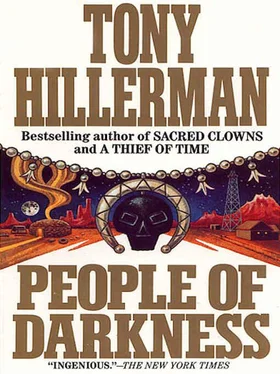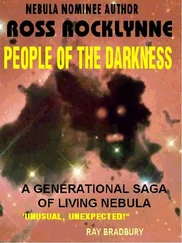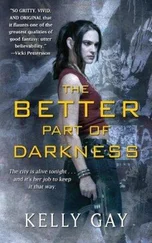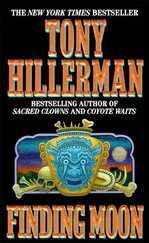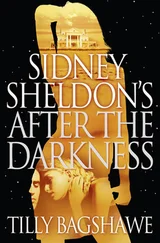Chee’s head ached. He closed his eyes again.
“You know,” Martin said, “I think I’d be careful if I were you.”
Chee had already had that thought.
WHEN MARTIN LEFT, Chee spent the next ten minutes on the telephone. He got Mary Landon’s number from information, but no one answered when he called it. He remembered then that it was a school day and called the school. Miss Landon had taken the day off. He called his own office, explained the situation, and told Officer Dodge to see if she could find Mary and do what she could do to keep an eye on her. The doctor came in then – a young man with red hair and freckles. He inspected Chee’s ribs, replaced the dressing, said, “Take it easy,” and left. The nurse arrived, took his temperature, gave him two pills, watched while he took them, said, “This isn’t a police station. You’re supposed to be resting,” and left. Chee rearranged himself on the pillow and gazed out across the university campus. He thought about Mary, and about the peyote religion, and B. J. Vines’ keepsake box, and the ways of white men, and drifted off into an uneasy sleep. When he awoke it was late afternoon. The sun was slanting through his window and Mary sat in the bedside chair.
“Hello,” she said. “How’re you feeling?”
“Fine,” Chee said. He did feel fine. Vastly relieved.
“Boy,” she said. “You sure scared me. I thought you were dead. I waved down a truck, and he got that state policeman on his CB radio. And when we got back to you, you were just lying there.” She grimaced at him. “Like dead.”
Chee told her what he’d learned about the blond man. “You see the problem? There’s a chance he’s going to decide he needs to get rid of us.”
Even as he was saying them, the words sounded melodramatic to him. In this quiet, antiseptic room, the idea of anyone wanting to kill Jim Chee and Mary Landon seemed foolish.
“Don’t you think what he’d really do is just run?” Mary asked. “That’s what I’d do.”
“But you’re not a professional gunman,” Chee said.
“If that remark’s a reflection on my shooting, I want to remind you that it was you who screwed up the rear sight.”
“Be serious,” Chee said. “This guy kills people.”
The humor left Mary’s face. “I know,” she said. “But what can you do? It’s sort of like being struck by lightning. You can’t go around all the time hiding from clouds.”
“But you don’t stand under trees while it’s raining, either,” Chee said. “Why don’t you take a leave and go off and visit some relatives somewhere for a while and don’t tell anyone where you’re going?”
Mary’s expression shifted from somber to skeptical. “Is that what you’re going to do?”
“I would if I could,” Chee said. “But I’m a policeman. It’s my business.”
“No, it’s not,” Mary said. “You don’t even have jurisdiction. That’s what you told me. It’s FBI business. Or maybe the sheriff’s.”
“Legally,” Chee said. “But this sore rib sort of gives me a special interest. And besides, I’m a material witness.”
“So am I,” Mary said.
They argued about it, an uneasy, tentative sparring of two persons not yet sure of their relationship.
Mary changed the subject to his earlier visitors, to Sheriff Sena, to Sena’s obsession with the death of his brother in the oil well explosion. The conversation was oddly strained and uncomfortable.
“When I get out of here,” Chee said, “I’m going to dig into the newspaper files and learn everything I can about that oil well accident, and get some names, and see what I can find out.”
“I’ll go see about it,” Mary said. “The university library keeps newspapers on microfilm?” She got up and collected her purse. “I’ll see if they have the right ones. If I hurry, I can get it done today.”
IT WAS 3:11 A.M. when Chee looked at his watch. He had been awake perhaps fifteen minutes, lying motionless with his eyes closed in the vain hope that sleep would return. Now he gave it up. Sleeping away the afternoon had left him out of tune with time. The nurse had given him another sleeping pill at ten o’clock but he had let it lay. His policy was to take pills only when unavoidable. Having his sleeping habits dislocated was the price he was now paying for that pill at lunch. He sat on the edge of the bed and put on the hospital slippers. Much of the soreness had gone out of his side. Only when he moved was there still pain under the heavy bandages. Through the curtain that now partitioned the room he could hear the heavy breathing of a drugged sleep. They had wheeled a man in from the post-surgery recovery room about midnight – a young Chicano sewn up after some sort of accident earlier in the evening. Chee flicked on his bed light and began to reread the newspaper. Through the curtain he heard his roommate mumble in his steep. The man shifted his position, groaned. Chee switched off the’ light. Let him sleep, he thought. This is the time of night for sleeping. But Chee had never felt more wide awake. He put on his robe and walked down to the nurse’s station. The nurse was a woman in her middle forties, with a round, placid face and a complexion marred by those ten thousand wrinkles the desert sun inflicts upon white people. She glanced up from her paperwork through bifocal glasses.
“Can’t sleep,” Chee said.
“Let’s see,” Bifocals said. “You’re Chee?’ She found his folder and glanced at it. “You had a pill at ten, but I guess I could give you another one.”
“I don’t like ’em,” Chee said. “They make me drowsy.”
Bifocals gave him a double take, detected the irony, and grinned. “Yes,” she said. “That’s the trouble with sleeping pills.”
“A while back this hospital lost a body,” Chee said. “Fellow named Emerson Charley. You hear about that?”
“Not officially,” Bifocals said. “But I heard.” She grinned at the memory. “There was some hell raised over it.”
“How could it happen? What do you do with bodies?”
“Well, first the attending physician comes, takes care of the certification,” Bifocals said. She looked thoughtful. “Then the body is tagged for identification and moved to the morgue on the second floor. It’s held there until relatives get a funeral home to claim it. Or, if there’s an autopsy, it’s tagged for that, and it’s held until the morphology laboratory does the postmortem. The way I heard about this one, it was tagged for an autopsy, but somebody came and took it.”
“Tell me about it,” Chee said.
“Nothing to tell. He died late in the day. The body was taken down and put in the cooler. In the morning, morphology called for it and the body was gone.” Bifocals grinned. “Lots of embarrassment. Lots of red faces.”
“Did somebody steal the body?”
“Had to be that,” Bifocals said. “Somebody in the family, probably. Indians usually don’t want an autopsy made.”
Chee didn’t correct her. Charley was a Navajo and most Navajos had even less distaste for autopsies than do whites. It was the Pueblo Indians who tended to resist autopsies. Their dead needed to be buried in the same cycle of the sun as their death. They had to begin on time the tightly scheduled four-day journey of the soul into eternity. But for most of the Navajo clans, death produced only a short-lived and evil ghost, and everlasting oblivion for the human consciousness. They had little sentiment for corpses.
“Could somebody just walk in and walk out with a body?” Chee asked.
“I guess they did,” Bifocals said. “And with clothing, too.” She chuckled. “We had two flaps out of this one. First the body was missing, and then two days later it turned out we’d given this Emerson Charley’s clothing to another corpse. Whoever took him took the other man’s clothing.”
Читать дальше
